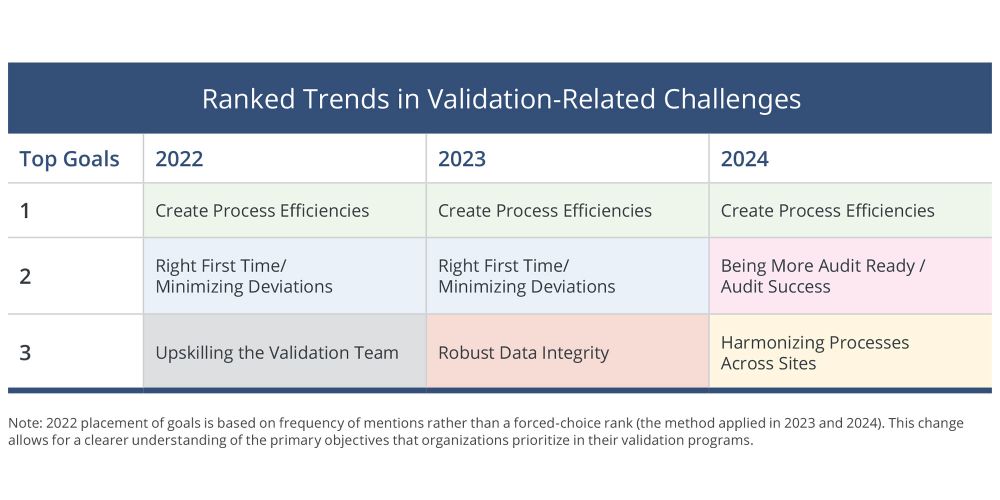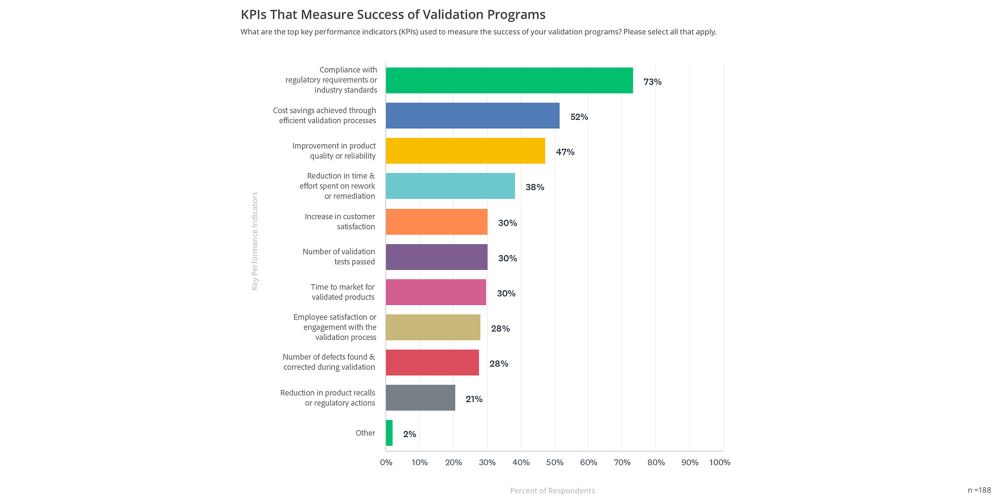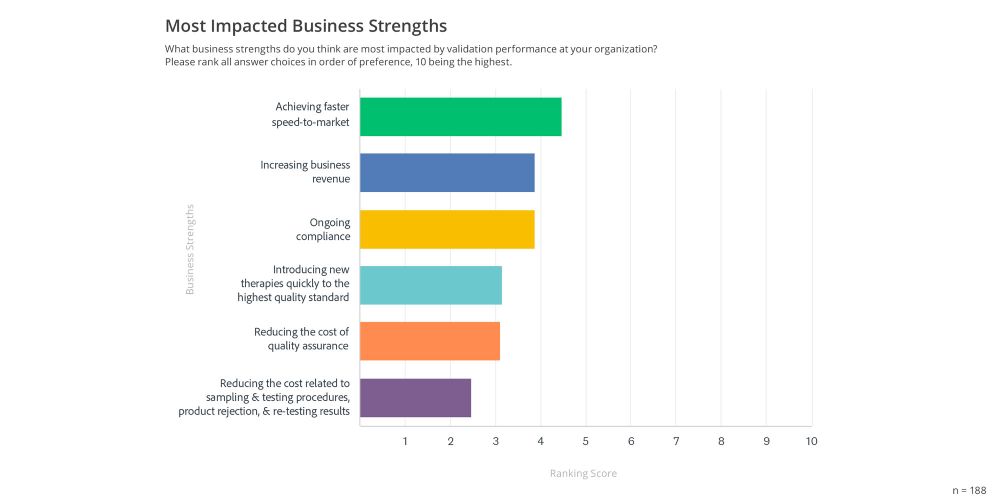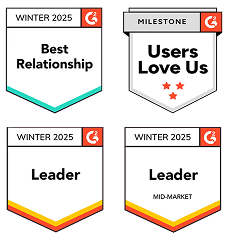The 2024 State of Validation report provides a unique overview of the evolving landscape of validation in highly regulated industries. A significant focus in this year’s report is on the trends surrounding validation goals, including key performance indicators (KPIs) used to measure the success of validation programs and the business strengths most impacted by validation performance.
These areas highlight how organizations are strategically adapting their validation processes to enhance efficiency, ensure compliance, and drive business growth. Let’s delve into the three key areas to understand the current trends and future directions in validation.
1. Trends in Validation Goals
The primary goals of validation programs have seen a notable evolution over recent years (see table below).

In 2024, the top priority for most organizations is to create process efficiencies. This goal underscores a strong focus on optimizing validation workflows to save time and resources while maintaining high standards of compliance and quality. Achieving process efficiency is not just about speed; it’s about ensuring that every step in the validation process is lean, effective, and contributes directly to the end goal of compliance and product quality.
Another notable goal is being more audit-ready and ensuring audit success. This shift indicates a heightened awareness of regulatory scrutiny and the need for organizations to maintain continuous audit readiness. The FDA’s increased focus on electronic audit trails and remote regulatory assessments has likely driven this emphasis, as organizations strive to be better prepared for unexpected audits.
The third key goal is harmonizing processes across different sites, reflecting the need for standardization and consistency in validation practices. As companies grow and expand globally, maintaining uniform validation processes becomes crucial to ensure that all locations comply with the same high standards and that data integrity is preserved across the board.
2. Trends in Key Performance Indicators (KPIs) for Validation
The KPIs used to measure the success of validation programs in 2024 have also evolved, mirroring the shifts in organizational priorities (see graph below).

The trends data from 2023 to 2024 highlights a consistent focus on Compliance With Regulatory Requirements or Industry Standards, Cost Savings Achieved Through Efficient Validation Processes, and Improvement in Product Quality or Reliability as the top three KPIs.
There is a shift in priority from the Number of Defects Found and Corrected During Validation in 2023 to Reduction in Time and Effort Spent on Rework or Remediation and Increase in Customer Satisfaction Ratings in 2024, indicating a growing emphasis on efficiency and customer-centric outcomes.
3. Business Strengths Impacted by Validation Performance
Validation performance significantly influences various business strengths, with the most impactful being the ability to achieve faster speed-to-market (see graph below).

As organizations strive to meet market demands and gain a competitive edge, the role of validation in accelerating product launches becomes critical. Efficient validation processes can reduce the time needed to bring new products to market, which is vital in fast-paced industries like pharmaceuticals and biotechnology.
Increasing business revenue is another strength closely tied to validation performance. Efficient validation processes not only speed up time-to-market but also enhance product quality and compliance, which can lead to higher sales and better market penetration. The direct correlation between robust validation processes and financial performance highlights the importance of investing in validation as a driver of business growth.
Ongoing compliance remains a critical business strength impacted by validation. Even as companies push for faster product development and launch timelines, maintaining compliance with regulatory standards is non-negotiable. Effective validation ensures that products consistently meet these standards, thereby protecting the company’s reputation and avoiding costly regulatory penalties.
Voice of the industry
What Specific Metrics Does Your Organization Use to Measure the Efficiency and Effectiveness of its Validation Programs?
We measure the effectiveness of our validation programs primarily by tracking the start-to-finish time – from project kickoff to the signing of the validation or qualification summary report.
Additionally, we monitor how long it takes to complete each document. This is a crucial KPI because delays are often due to system owners’ availability rather than the validation team. We track the time spent on validation tasks outside the validation team’s control, as the company typically prefers to keep validation resources focused on their primary responsibilities in the labs. This KPI helps us address frequent pushbacks related to resource allocation.
Lead CSV Consultant, Consulting Services Company, U.S.A.
Final Thoughts
The 2024 State of Validation report highlights the dynamic and evolving nature of validation practices across industries. As organizations continue to prioritize efficiency, compliance, and quality, the role of validation becomes increasingly strategic.
The trends in validation goals, KPIs, and business strengths underscore a shift towards more integrated, efficient, and outcome-driven validation processes. By aligning validation efforts with broader business objectives, companies can not only ensure compliance and product quality but also drive significant business growth and competitive advantage.
As we move forward, it will be essential for organizations to continue adapting their validation strategies to keep pace with regulatory changes and technological advancements.
To dive deeper into these trends and gain actionable insights for your organization, download the full 2024 State of Validation report now and stay ahead in your validation journey.






